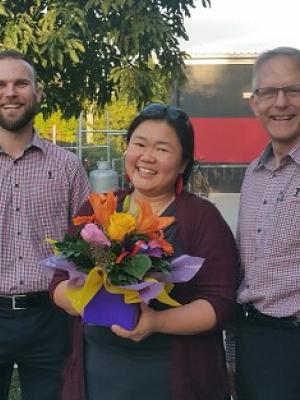For PhD candidates, three years of intense researching, reading, writing and re-writing culminates in one moment – pressing the ‘Submit’ button to upload an 80,000 word thesis. But what happens next? In most cases, nothing; just silence and waiting. It can take up to six months for the thesis examiners to return their feedback. This is a difficult period for PhD candidates because their thesis is out of their hands, and they can feel disempowered due to their detachment from the thesis examination process.
Jen Teh, a PhD candidate at The University of Queensland anticipated the submission slump, and set about organising a placement to do something positive and productively with her time post-submission. Dr David King, Jen’s Advisor from the Faculty of Medicine, recognised the benefits of undertaking a placement at this particular time. “Jen organised this placement on her own initiative, though we did actively discuss ways to prevent the post PhD blues,” he said. “Particularly in her case with an unexpected delay in the marking of her thesis, the placement provided constructive use of her time and skills rather than waiting in limbo.”
Once Jen had made the decision to pursue a new experience in the form of a placement, things moved quickly. Jen was highly effective and accomplished a lot during her 30-day placement. “I researched for the initial design phase of the Siblings Reconnect revamp, doing a literature review and interviewing stakeholders such as researchers, child advocates, and former carers. With their input, I synthesised a ‘Journey to Impact’ document outlining key outcomes for the program, activities to achieve those outcomes, and validation measures to evaluate the impact. I was able to share my findings and suggestions with YMCA senior management. We discussed the cost-benefits analysis using estimates from other sibling or foster care intervention programs, and jointly worked out details for a pilot project.”
The placement provided Jen with a fresh challenge in a not-for-profit environment. The chance to see her ideas gain momentum quickly, along with decisiveness that allowed things to be put into practice rapidly were novel differences to PhD research, something Jen found both energising and enjoyable. “Professionally, I have grown by stretching myself to research a field that I had little prior knowledge of. Almost every day, I would learn something new,” said Jen. It is this opportunity to combine newly learnt skills with existing research skills that make the placement experience so valuable for PhD candidates.
Placements are a great way to make the most of the gap between thesis submission and conferral of the PhD. Professor Alastair McEwan, Dean of UQ’s Graduate School is pleased to see more candidates taking advantage of this opportunity. “Today’s PhD is about much more than an 80,000 word thesis. At UQ, we are committed to graduating well-rounded researchers capable of contributing significantly in a wide range of contexts,” said Professor McEwan. In Jen’s case, the placement has provided her with new directions to pursue after graduation. “I think Jen may well continue to combine social needs and research in the community,” said Associate Professor Watson. Dr King agrees, “The placement has provided Jen with a good transition to future long-term employment.” As Jen puts it, “The placement boosted my confidence and motivation to continue doing research and advocacy work.” It will be exciting to see where Jen’s post-PhD journey takes her next.


